Background
Shoshana Felman was born on January 29, 1942, in France.

Jerusalem, Yerushalayim, Israel
Hebrew University of Jerusalem
Geneva, Switzerland
University of Geneva
Cities of Grenoble, Saint-Martin-d'Hères & Gières, France
University of Grenoble
New Haven, Connecticut, United States
Yale University
Abba Khoushy Ave 199, Haifa, 3498838, Israel
University of Haifa
53 Wall St, New Haven, CT 06511, United States
Whitney Humanities Center
John Simon Guggenheim Memorial Foundation








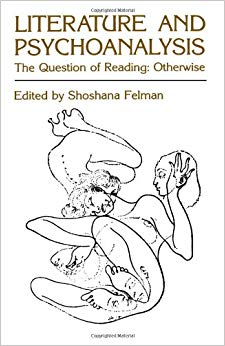
(The relationship between literature and psychoanalysis ha...)
The relationship between literature and psychoanalysis has never been one of equals. Traditionally (particularly in American tradition), literature has been relegated to the position of foil for its more abstract counterpart - a mere body of language to be explained through the theoretical authority of psychoanalysis and, through its need to be interpreted, to ad justification and prestige to Freudian theory.
https://www.amazon.com/gp/product/080182754X/?tag=2022091-20
1982
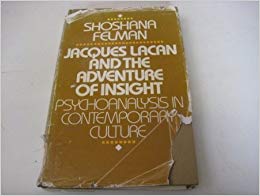
(Jacques Lacan, one of the most influential and controvers...)
Jacques Lacan, one of the most influential and controversial French thinkers of the twentieth century, was a practicing and teaching psychoanalyst in Paris, but his revolutionary seminars on Freud reached out far beyond professional circles: they were enthusiastically attended by writers, artists, scientists, philosophers, and intellectuals from many disciplines. Shoshana Felman elucidates the power and originality of Lacan's work. She brilliantly analyzes Lacan's investigation of psychoanalysis not as dogma but as an ongoing self-critical process of discovery. By focusing on Lacan's singular way of making Freud's thought new again--and of thus enabling us to participate in the very moment of intellectual struggle and insight--Felman shows how this moment of illumination has become crucial to contemporary thinking and has redefined insight as such. This book is a groundbreaking statement not only on Lacan but on psychoanalysis in general. Felman argues that, contrary to popular opinion, Lacan's preoccupation is with psychoanalytic practice rather than with theory for its own sake. His true clinical originality consists not in the incidental innovations that separate his theory from other psychoanalytic schools, but in the insight he gives us into the structural foundations of what is common to the practice of all schools: the transference ation and the psychoanalytic dialogue. In chapters on Poe's tale "The Purloined Letter"; Sophocles' Oedipus plays, a case report by Melanie Klein, and Freud's writings, Felman demonstrates Lacan's ediscovery of these texts as renewed and renewable intellectual adventures and as parables of the psychoanalytic encounter. The book explores these questions: How and why does psychoanalytic practice work? What accounts for clinical success? What did Freud learn from the literary Oedipus, and how does Freud text take us beyond Oedipus? How does psychoanalysis inform, and radically displace, our conception of what learning is and of what reading is? This book will be an intellectual event not only for clinicians and literary critics, but also for the broader audience of readers interested in contemporary thought.
https://www.amazon.com/gp/product/0674471202/?tag=2022091-20
1987
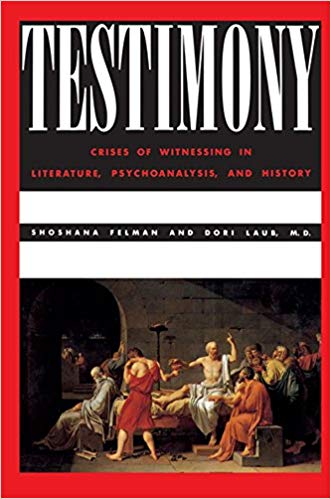
(In this unique collection, Yale literary critic Shoshana ...)
In this unique collection, Yale literary critic Shoshana Felman and psychoanalyst Dori Laub examine the nature and function of memory and the act of witnessing, both in their general relation to the acts of writing and reading, and in their particular relation to the Holocaust. Moving from the literary to the visual, from the artistic to the autobiographical, and from the psychoanalytic to the historical, the book defines for the first time the trauma of the Holocaust as a radical crisis of witnessing "the unprecedented historical occurrence of...an event eliminating its own witness." Through the alternation of a literary and clinical perspective, the authors focus on the henceforth modified relation between knowledge and event, literature and evidence, speech and survival, witnessing and ethics.
https://www.amazon.com/gp/product/B00G24TPXG/?tag=2022091-20
1992
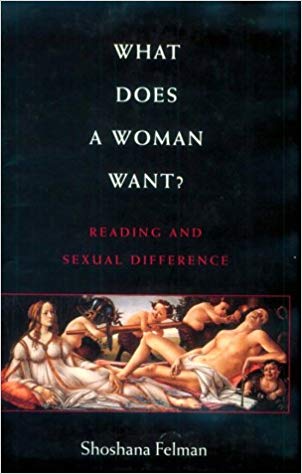
('What does a woman want?'--the question Freud famously fo...)
'What does a woman want?'--the question Freud famously formulated in a letter to Marie Bonaparte--is a quintessentially male question that arises from women's resistance to their place in a patriarchal society. But what might it mean, asks Shoshana Felman, for a woman to reclaim this question as her own? Can this question engender, through the literary or the psychoanalytic work, a woman's voice as its speaking subject? Felman explores these questions through close readings of autobiographical texts by Virginia Woolf, Simone de Beauvoir, and Adrienne Rich which attempt to redefine women as the subject of their own desire. "Shoshana Felman is a reader of unparalleled subtlety."--Marjorie Garber, Harvard University.
https://www.amazon.com/gp/product/080184617X/?tag=2022091-20
1993
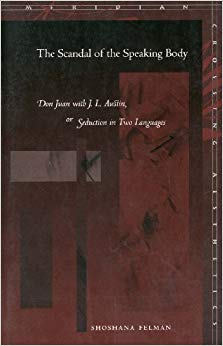
(What is a promise? What are the consequences of the act o...)
What is a promise? What are the consequences of the act of promising? In this bold yet subtle meditation, the author contemplates the seductive promise of speech and the seductive promise of love. Imagining an encounter between Molière’s Don Juan and J. L. Austin, between a mythical figure of the French classical theater and a twentieth-century philosopher, she explores the relation between speech and the erotic, using a literary text as the ground for a telling encounter between philosophy, linguistics, and Lacanian psychoanalytic theory. In the years since the publication of this book (which the author today calls “the boldest, the most provocative, but also the most playful” she has written), speech act theory has continued to play a central and defining role in the theories of sexuality, gender, performance studies, post-colonial studies, and cultural studies. This book remains topical as readers increasingly discover how multiply relevant the speaking body is. Moving beyond the domain of formal linguistic analysis to address these questions, the author has written a daring and seductive book.
https://www.amazon.com/gp/product/0804744521/?tag=2022091-20
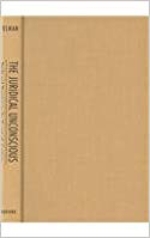
(Death, wrote Walter Benjamin, lends storytellers all thei...)
Death, wrote Walter Benjamin, lends storytellers all their authority. How do trials, in turn, borrow their authority from death? This book offers a groundbreaking account of the surprising interaction between trauma and justice. Moving from texts by Arendt, Benjamin, Freud, Zola, and Tolstoy to the Dreyfus and Nuremberg trials, as well as the trials of O. J. Simpson and Adolf Eichmann, Shoshana Felman argues that the adjudication of collective traumas in the twentieth century transformed both culture and law. This transformation took place through legal cases that put history itself on trial, and that provided a stage for the expression of the persecuted--the historically "expressionless." Examining legal events that tried to repair the crimes and injuries of history, Felman reveals the "juridical unconscious" of trials and brilliantly shows how this juridical unconscious is bound up with the logic of the trauma that a trial attempts to articulate and contain but so often reenacts and repeats. Her book gives the drama of the law a new jurisprudential dimension and reveals the relation between law and literature in a new light.
https://www.amazon.com/gp/product/0674009312/?tag=2022091-20
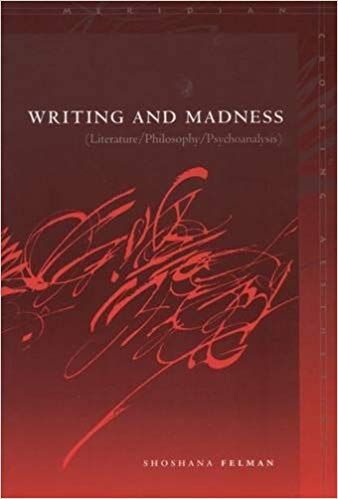
(Writing and Madness is Shoshana Felman's most influential...)
Writing and Madness is Shoshana Felman's most influential work of literary theory and criticism. Exploring the relations between literature, philosophy, and psychoanalysis through brilliant studies of Balzac, Nerval, Flaubert, and James, as well as Lacan, Foucault, and Derrida, this book seeks the specificity of literature in its relation to what culture excludes under the label "madness." Why and how do literary writers reclaim the discourse of the madman, and how does this reclaiming reveal something essential about the relation between literature and power, as well as between literature and knowledge? Every literary text continues to communicate with madness―with what has been excluded, decreed abnormal, unacceptable, or senseless―by dramatizing a dynamically revitalized relation between sense and nonsense, reason and unreason, the readable and the unreadable. This revelation of the irreducibility of the relation between the readable and the unreadable constitutes what the author calls la chose littéraire―the literary thing.
https://www.amazon.com/gp/product/0804744483/?tag=2022091-20
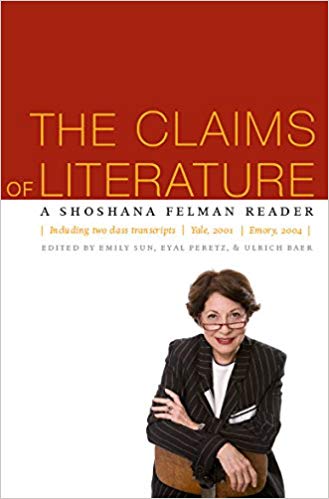
(Shoshana Felman ranks as one of the most influential lite...)
Shoshana Felman ranks as one of the most influential literary critics of the past five decades. Her work has inspired and shaped such divergent fields as psychoanalytic criticism, deconstruction, speech-act theory and performance studies, feminist and gender studies, trauma studies, and critical legal studies. Shoshana Felman has not only influenced these fields: her work has opened channels of communication between them. In all of her work Felman charts a way for literary critics to address the ways in which texts have real effects in the world and how our quest for meaning is transformed in the encounter with the texts that hold such a promise. The present collection gathers the most exemplary and influential essays from Felman’s oeuvre, including articles previously untranslated into English. The Claims of Literature also includes responses to Felman’s work by leading contemporary theorists, including Stanley Cavell, Judith Butler, Julia Kristeva, Cathy Caruth, Juliet Mitchell, Winfried Menninghaus, and Austin Sarat. It concludes with a section on Felman as a teacher, giving transcripts of two of her classes, one at Yale in September 2001, the other at Emory in December 2004.
https://www.amazon.com/gp/product/082322712X/?tag=2022091-20
Shoshana Felman was born on January 29, 1942, in France.
Felman obtained Bachelor of Arts degree at the Hebrew University of Jerusalem in 1964, as well as master's degree in 1966. She also attended the University of Geneva, from 1969 to 1970. That same year she received her doctor's degree with the highest distinction from the University of Grenoble.
For the preparation of doctoral dissertation in France, Felman was awarded French government fellowship, in 1967–1968. She also received Swiss government fellowship for study at the University of Geneva, in 1969–1970. She won prizes from the University of Geneva in 1970, and from the University of Grenoble in 1972, for the best doctoral dissertation.
During her career, Felman held various positions at the Yale University. She began in 1970 as an instructor, becoming an assistant professor a year later. Two more years later Felman was appointed as an associate professor, she stayed there for 7 years. From 1980 till 1986 she was a director of graduate studies for French department. For 18 years from 1986, she worked as a Thomas E. Donnelly Professor of French and Comparative Literature at that same educational institution. Also, Felman was a member of numerous academic committees at the Yale University, including the Danforth Fellowship committee, the advisory committee of the arts and sciences on the education of women and the search committee on senior appointment in Judaic studies. Simultaneously, Felman served at the position of a visiting professor at the University of Haifa in 1973.
Nowadays, she serves as an American literary critic and Woodruff Professor of Comparative Literature and French at the Emory University.
Felman concentrates on such themes as 19th and 20th-century French literature, psychoanalysis, trauma and testimony, law and literature, performativity theory, feminism, Holocaust testimony.
Her publications include several works on literature and psychoanalysis, among them Writing and Madness: Literature/Philosophy/Psychoanalysis and Literature and Psychoanalysis: The Question of Reading-Otherwise. She is also considered one of the foremost readers of the works of twentieth-century psychoanalyst Jacques Lacan.
Felman has written extensively on feminism in literature, as evidenced in her 1993 publication, What Does a Woman Want? Reading and Sexual Differences. In this study, Felman, borrowing psychoanalyst Sigmund Freud’s famous question for her title, examines several examples of feminist literature to explain her theory that women do not have autobiographies and to shed light on masculine and feminine differences as depicted in literature. The first and final chapters explore the first theory, while the middle chapters look at autobiographical essays by Virginia Woolf, Adrienne Rich, and Simone de Beauvoir, as well as writings by Freud and Honoré de Balzac.
(Jacques Lacan, one of the most influential and controvers...)
1987(In this unique collection, Yale literary critic Shoshana ...)
1992('What does a woman want?'--the question Freud famously fo...)
1993(What is a promise? What are the consequences of the act o...)
(Writing and Madness is Shoshana Felman's most influential...)
(Shoshana Felman ranks as one of the most influential lite...)
(The relationship between literature and psychoanalysis ha...)
1982(Death, wrote Walter Benjamin, lends storytellers all thei...)
